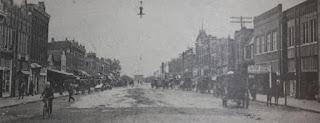This New Jersey native was near the end, and did he
know it? Johnson Oatman, Jr.had written, by the time he composed “I’ll Be a Friend
to Jesus”, thousands of hymns, so what more was there for this 66-year-old man
to say? Since his death is recorded in the same year that this song is credited
to him, perhaps he really just wanted to circle back to how he felt, to his focal
point as a believer, before he would die. In that year, he was evidently
engaged in taking the message outside of his native area (including Norman,
Oklahoma, shown here in 1900 – perhaps not too different from the way it looked
to Johnson in 1922), so perhaps he could feel that he was ready to go, although
he may have expected to return to New Jersey. His life as a businessman had no
doubt led him to encounters with many people, so it must have been important to
remind himself and others whose friendship he really counted upon, especially
since he undoubtedly expected this one to continue on another plane.
Johnson Oatman’s upbringing and life as a
businessman must have ingrained within him the sentiment he expressed
repeatedly in “I’ll Be a Friend…”. It’s said that a portion of Oatman’s youth
was spent listening to his father singing church hymns, a love that evidently took
root within the son, who by his life’s end had authored some 3,000 hymns. This
father and son with the same name were also close in their vocational life as
well, being partner-merchants in Lumberton, New Jersey for many years. Though
the son was licensed as a minister, he reportedly preached only locally, and spent
much of his time as a businessman when his father was alive, and then in an insurance
enterprise in Mt. Holly (also in New Jersey) following his father’s death. Nevertheless,
Johnson’s avocation would have no doubt been well-known to customers and
counterparts in the business world who knew him. To write 3,000 hymn texts, he
would most likely have engaged in some of this while otherwise occupied making
his living. What kind of businessman-insurance man was he? With Jesus as his
friend, one can imagine he was influential on a personal level. What venture
had taken him to Norman, Oklahoma in 1922, where he died, is unknown. Perhaps he
saw business opportunities in this recently established state (since 1907), or
was there only temporarily. Whatever the reason, perhaps it was his stay in
this ‘Bible-belt state’ that prompted him to consider his friendship with the
Divine One.
How does one measure the value of a friend? Johnson
may have asked himself that as he composed the words that survive him nearly
100 years later. Oatman’s answer was that he measured it in length, ‘until…(the)
end’ (refrain and v.2); in places he might not have gone otherwise (v.3); and in
telling others about him (v.4). Can’t you just imagine Johnson saying, ‘Got a
friend like that, yet’?
See these sites for all four verses and refrain, and
a short biography on the composer: http://www.hymnary.org/text/they_tried_my_lord_and_master
This site shows the composer died in Oklahoma,
though he had otherwise lived in New Jersey: http://www.hymntime.com/tch/bio/o/a/t/oatman_j.htm
This site describes the city where the composer
died: https://en.wikipedia.org/wiki/Norman,_Oklahoma


No comments:
Post a Comment